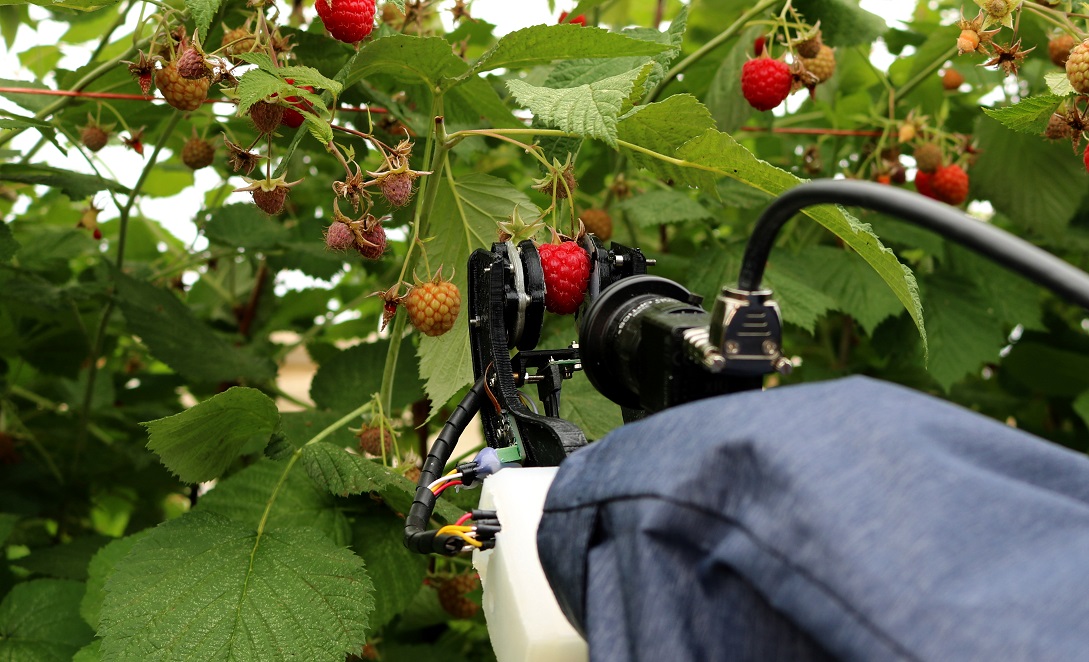Please click here to access the main AHDB website and other sectors.
Agriculture and the under-estimated potential for applying advance robotics
Tuesday, 18 December 2018
Dr Martin Stoelen, Lecturer in Robotics at the University of Plymouth, and Founder and Director of Fieldwork Robotics Ltd explains why robotic harvesters may be closer to reality than we think
There is no doubt about it, robots are now part of our everyday lives. Whether we are at work, in the home or enjoying leisure time, the impact of robots can be seen all around us.
In that context, it makes sense for them to be integrated into rural life. After all, farmers have for centuries benefitted from the very latest advances in engineering.
But how can the latest developments in robotics technology genuinely improve life for the farmers of today? And how can we as scientists ensure the projects we are working on not only meet the demands of rural life, but make things easier in every sense for farmers in the long term?
Agri-tech is a fast emerging sector, and we have been developing agricultural robots for some years. I first saw the potential for them when I was growing up in Norway, but we now have several projects running in tandem at the University of Plymouth, looking at the potential for robots to be used to pick tomatoes, raspberries and cauliflowers.
On the face of it, picking these particular crops might seem to require very different solutions. However that, we believe, is the beauty of our technology.
By being flexible – both in terms of the arm we have created and its versatility – we have a series of robots that can meet the demands of farmers in a cost-effective and efficient way.
However, it would be easy for us to develop something that we believed could make a difference. The real challenge is to then pass our enthusiasm to growers who might have operated in the same way for decades or longer, and for good reasons.
It is why farmers are an integral part of the team when we develop our robotic solutions, and those we are currently working with – including Riviera Produce in Cornwall, and the Hall Hunter Partnership in Berkshire – share our hopes.

Currently, manual harvesting represents a large portion of a producers’ total costs, often it can be above 50%, so looking at addressing that – especially against a backdrop of Brexit, and the repercussions of this for years to come – is crucial.
There will always be jobs for people associated with agriculture. But it might be that in a decade’s time, instead of spending hours in the cab of a tractor, your role is managing robots such as those we are developing. Or it might be that task like harvesting will be outsourced to a robot service provider.
And while machines such as this will make life easier and simpler, it’s also cool technology. With the constant concerns over the future of agriculture, it might encourage more young people to choose it as a career.
We’d like to prove robotics technology that can work in rural environments is not only possible, but affordable, viable and can help increase productivity on farms.
The technology is evolving rapidly, costs are coming down and developments can happen fast, which means technology like this will soon become a practically possible and commercially viable reality.
Let’s be honest, it’s not going to be an overnight revolution. But five or 10 years from now, these robots will be far more than a figment of our imagination.
Agriculture has been under-estimated as a potential area for applying advance robotics but it’s been inspiring to see the enthusiasm of local producers – now could be its time.
- The research is being funded by Agritech Cornwall, part-funded by the European Regional Development Fund (ERDF) with match-funding from Cornwall Council, and two grants from the Agri-Tech in China: Newton Network+ (ATCNN) fund. For more information, visit https://www.plymouth.ac.uk/news/scientists-develop-harvesting-robots-that-could-revolutionise-farming-practices and https://fieldworkrobotics.github.io/.
Dr Martin Stoelen will be talking about the development of robotic harvesters at SmartHort 2019 on 6-7 March 2019, Stratford-upon-Avon. To find out more and to book your place, click here.
Image credits: University of Plymouth
Topics:
Sectors:
Tags:

